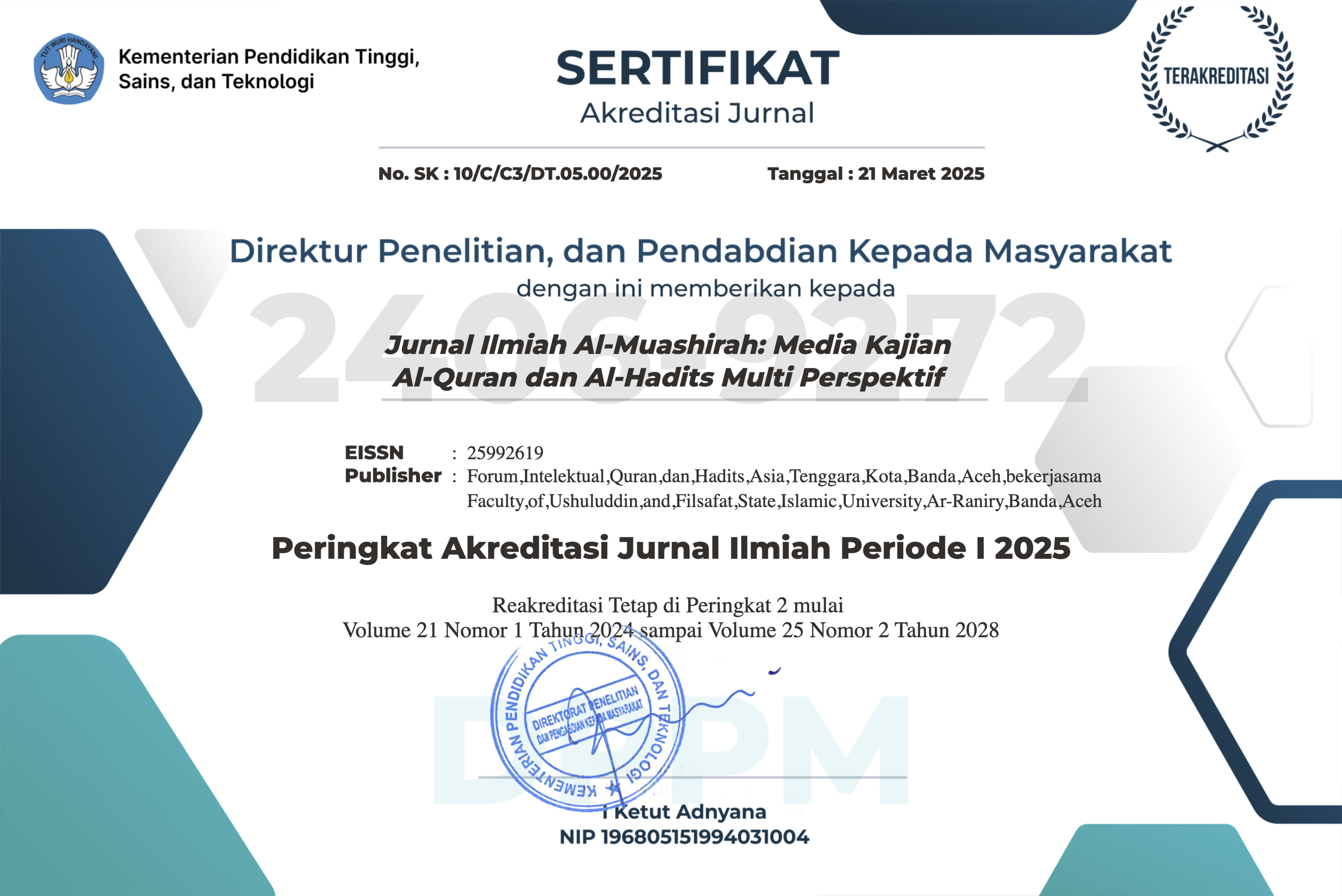Prejudice: A Comparative Study of The Perspectives in Tafsir Al-Ibriz and Tafsir Fi Zilalil-Qur'an
DOI:
https://doi.org/10.22373/jim.v20i2.19063Keywords:
Al-Ibrīz, Al-Qur'an, Fi Ẓilālil-Qur'ān/ Interpretation/ PrejudiceAbstract
Human beings are social creatures that require interactions among individuals. Encountering those who hold various prejudices towards individuals or different groups in their surroundings often leads to conflicts and animosity among fellow beings. Therefore, the presence of prejudices, whether positive or negative, significantly affects one's attitude and behavior in societal life. This study elucidates the commonalities and differences of prejudices as presented in the interpretations of Al-Ibrīz and Tafsīr Fī Ẓilālil-Qur'ān, and how prejudice is classified in contemporary society. The purpose of this research is to identify the similarities and disparities in prejudices as depicted in the interpretations of Al-Ibrīz and Tafsīr Fī Ẓilālil-Qur'ān, as well as to understand the classification of prejudices in modern society. The research employs a comparative method using the technique of library research, with Al-Ibrīz by Bisri Musthofa and Tafsīr Fī Ẓilālil-Qur'ān by Sayyid Quthb as the primary sources of reference. The findings of this study indicate: 1.) Both commentators share a similar interpretation of prejudice, which is the prohibition of harboring excessive prejudices, as some forms of prejudice are considered sinful. However, there is a difference in their interpretations. According to Bisri Musthofa, engaging in prejudice by seeking out others' faults and flaws can lead to slander. On the other hand, according to Sayyid Quthb, it is advised not to be easily swayed by conjectural whispers and to strive to eliminate slander to preserve the bond of brotherhood among people. 2.) Prejudice is prevalent in societal life. As individuals engage in the world of social interaction, they are bound to encounter numerous instances where various types of prejudices, both positive and negative, are ingrained.
Downloads
References
Al-Baqiy, Muhammad Fuad ‘Abd, Al-Mu’jam Al-Mufahras Li Al-Fazh Al-Qur’an Al-Karim (Beirut, Lebanon: Dar al-Ma’rifat, 1992)
Al-Naysaburi, Muslim Ibn Al-Muslim Ibn Al-Ḥajaj Abu Al-Ḥasan Al-Qusyairi, Shahih Muslim Juz 4 (Beirut: Dār Ihya Al-Turats Al-’Arabi)
Al-Qurtubi, Abu ‘Abdullah bin Ahmad bin Abu Bakar, Al-Ja>mi’ Li Ahka>m Al-Qur’an (Beirut: Da>r Ihya al-Turats> al-‘Arabi)
Al-Thabari, Abu Ja’far Muhammad Jari>r, Ja>mi’ Al-Baya>n ‘an Ta’Wil Ay AlQur’an, Tahqiq: Ahmad Muhammad Sya>kir (Ordon: Da>r al-A’lam, 2002)
Baidan, Nashruddin, Metodologi Penafsiran Al-Qur’an (Yogyakarta: Pustaka Pelajar, 2012)
Bakri, Mubarak, ‘Prasangka Dalam Al-Qur’an’, Rausyan Fikr, 14 (2018), 61–87
Bigazzi, Sára, Anna Siegler, Sára Serdült, Ildikó Bokrétás, and Bálint Takács, ‘A Measure of Perceived Identity Threat and of Distancing Relevant Others: Development of the Multiple Threat and Prejudice Questionnaire’, Open Journal of Social Sciences, 07.10 (2019), 237–54 <https://doi.org/10.4236/jss.2019.710019>
Fāris, Abū Al-Ḥusain Aḥmad Ibnu, Mu’jam Al-Muqāyīs Al-Lugah (Beirut: Dār al-Fikr, 1979)
Jahrotunnisa, Ani, ‘Makna Prasangka Menurut Buya Hamka Dalam Tafsir Al-Azhar’, Skripsi, 2020
Kholifah, ‘Dampak Prasangka Buruk Anak Terhadap Orang Tua (Telaah Q.S Yusuf Ayat 8-10)’ (UIN Sunan Ampel Surabaya, 2017)
Kiehn, Ole, and Car, ‘Self-Reported Experiences Of Discrimination And Health: Scientific Advances, Ongoing Controversies, And Emerging Issues’, Physiology & Behavior, 176.3 (2017), 2–3 <https://doi.org/10.1146/annurev-clinpsy-032814-112728.SELF-REPORTED>
Lajnah Pentahsihan Mushaf Al-Qur’an, Tafsir Al-Qur’an Tematik: Etika Berkeluarga, Bermasyarakat Dan Berpolitik (Jakarta: Aku Bisa, 2012)
Lotun, Shaaba, Veronica M. Lamarche, Spyridon Samothrakis, Gillian M. Sandstrom, and Ana Matran-Fernandez, ‘Parasocial Relationships on YouTube Reduce Prejudice towards Mental Health Issues’, Scientific Reports, 12.1 (2022) <https://doi.org/10.1038/s41598-022-17487-3>
Meyer, Ilan H., ‘Prejudice as Stress: Conceptual and Measurement Problems’, American Journal of Public Health, 93.2 (2003), 262–65 <https://doi.org/10.2105/AJPH.93.2.262>
Musthofa, Bisri, Tafsir Al-Ibrīz (Rembang: Menara Kudus, 2015)
Nafi’ah, F A, ‘Prasangka (Zan) Terhadap Orang Lain: Studi Maanil Al Hadith Atas Hadis Riwayat Imam Muslim No. 2563 Perspektif Ilmu Psikologi’ (UIN Sunan Ampel Surabaya, 2020)
Quthb, Sayyid, Tafsir Fī Ẓilālil Qur’ān Jilid I (Beirut: Darusy-Ayuruq, 1992)
———, Tafsir Fī Ẓilālil Qur’ān Jilid IV (Beirut: Darusy-Ayuruq, 1992)
———, Tafsir Fī Ẓilālil Qur’ān Jilid VI (Beirut: Darusy-Ayuruq, 1992)
———, Tafsir Fī Ẓilālil Qur’ān Jilid VIII (Beirut: Darusy-Ayuruq, 1992)
———, Tafsir Fī Ẓilālil Qur’ān Jilid X (Beirut: Darusy-Ayuruq, 1992)
———, Tafsir Fī Ẓilālil Qur’ān Jilid XII (Beirut: Darusy-Ayuruq, 1992)
Rahmah, Mamluatur, ‘Husnuzan Dalam Perspektif Al-Qurâ€TMan Serta Implementasinya Dalam Memaknai Hidup’, Academic Journal of Islamic Principles and Philosophy, 2.2 (2022), 191–213 <https://doi.org/10.22515/ajipp.v2i2.4550>
RI, Departemen Agama, Al-Qur’an Dan Tafsirnya Jilid IX (Jakarta: Widya Cahaya, 2011)
———, Al-Qur’an Dan Tafsirnya Jilid X (Jakarta: Lentera Abadi, 2010)
RI, Kemenag, ‘Terjemahan Qur’an’, 2019
Sayyadi, ‘Prasangka Dalam Al-Qur’an Perspektif Sayyid Quthb’, Skripsi, 2019
Shihab, M. Quraish, Tafsir Al-Misbah: Pesan, Kesan Dan Keserasian Al-Qur’an (Jakarta: Lentera Hati, 2002)
Yahya, I F, ‘Makna Lafaz Al-Zan Dalam Surah Al-Hujurat Ayat 12 Perspektif Ulama Tafsir’ (UIN Sunan Ampel Surabaya, 2019)
Yusuf LN, Syamsu, Kesehatan Mental Perspektif Psikologi Dan Agama (Bandung: Remaja Rosdakarya, 2021)
Downloads
Published
Issue
Section
License
Authors who publish in Jurnal Ilmiah Al-Mu'ashirah agree to the following terms:
- Authors retain copyright and grant the journal right of first publication with the work simultaneously licensed under a Attribution-ShareAlike 4.0 International (CC BY-SA 4.0) License that allows others to share the work with an acknowledgment of the work's authorship and initial publication in this journal.
- Authors are able to enter into separate, additional contractual arrangements for the non-exclusive distribution of the journal's published version of the work (e.g., post it to an institutional repository or publish it in a book), with an acknowledgment of its initial publication in this journal.
- Authors are permitted and encouraged to post their work online (e.g., in institutional repositories or on their website) prior to and during the submission process, as it can lead to productive exchanges, as well as earlier and greater citation of published work (See The Effect of Open Access).













